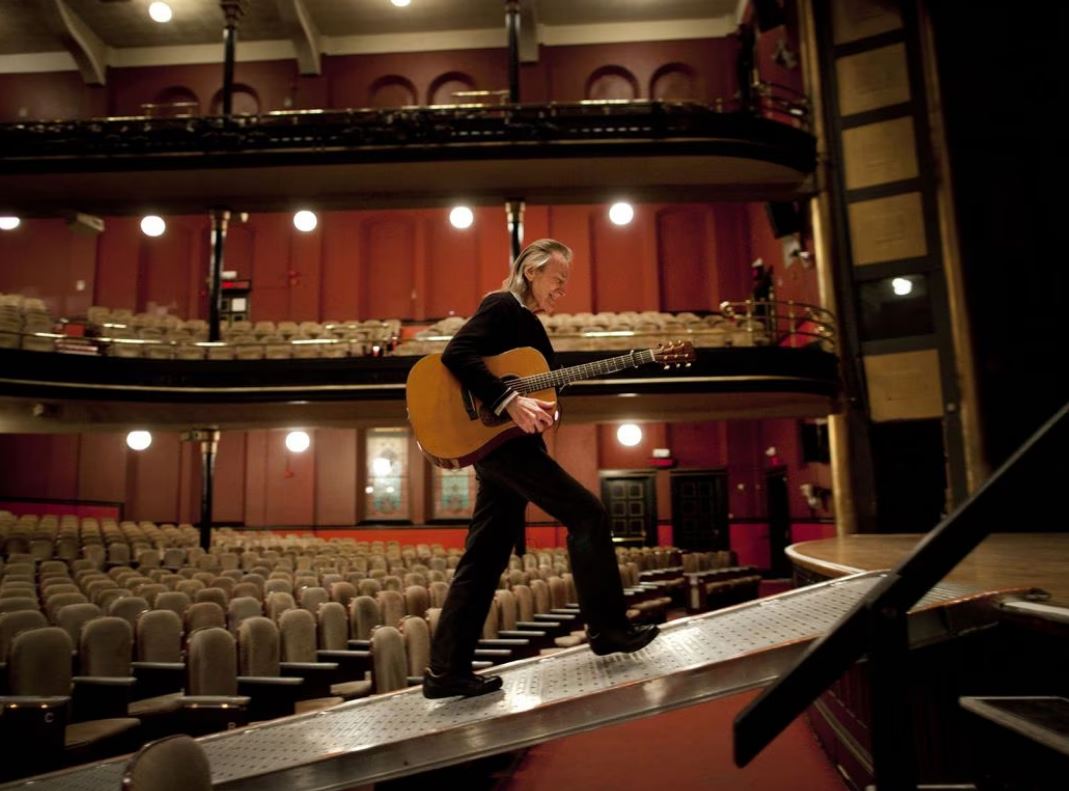Gordon Lightfoot died at Toronto’s Sunnybrook Hospital on Monday evening. He was 84 years old. He had been suffering from emphysema and had recently cancelled his upcoming concerts. His family said he died peacefully of natural causes.
Shortly before he died, the iconic Canadian singer-songwriter spoke to his long-time friend and booking agent, Bernie Fiedler: “Bernie, we had a good run.”
That is an understatement – “a good run” – that is in keeping with Lightfoot’s character. “I still question my own ability,” he told me during a 2019 interview at his house in Toronto’s Bridle Path neighbourhood. “I have my whole life, and I continue to do so. I don’t consider myself to be a genius, by any stretch of the imagination. It bothers me to be referred to as such.”
Perhaps that is the modesty of a “fair-haired farm boy from Orillia,” as The Globe and Mail’s John MacFarlane described the smalltown Ontarian in 1966. The title of that profile, one of the first major Lightfoot features ever published, was “Lyrical loner.” For a perfectionist prone to writer’s block, creating songs was a lonesome, laborious task. Fuelled by coffee, cigarettes and a fat commission, Lightfoot wrote Canadian Railroad Trilogy in three days. He once likened songwriting sessions to dentist appointments, which is to say they were unpleasant but necessary – just get them over with.

So, he was his own worst critic. And, yet, I believe he was also his own biggest fan. (Which might not mean anything other than he had good taste.) At the annual Gordon Lightfoot tribute nights that ran for 15 years at Hugh’s Room in Toronto, the songwriter being feted would often show up, sitting in the back to listen to the interpretations of his compositions. His eyes were closed as he (apparently blissfully) took in the sounds.
In 2012, I interviewed him at Toronto’s Massey Hall, where he performed on more than 170 occasions. After giving me a tour of the empty venue – “This is where I tune my guitar,” he said, pointing to a small room backstage – he walked onto the stage and played Knotty Pine and I’ll Tag Along, murmuring the words to himself, again eyes closed: “This time tomorrow, we might be all packed and gone; I believe it’s best we carry on.”
He wasn’t performing for me or anyone else, just himself.
Lightfoot was the kind of artist the term singer-songwriter was designed for. He wrote and sang songs that were reflections of his own life but with an eye for universal lyrical appeal and, yes, commerciality. He performed his material eloquently.
For what it is worth, Lightfoot once listed the nine essential songs of his concert setlists: Canadian Railroad Trilogy; Early Morning Rain; Don Quixote; In My Fashion; Beautiful; The Wreck of the Edmund Fitzgerald; Sundown; Carefree Highway; and If You Could Read My Mind.

Lightfoot had his favourites, as do you, and as do I. The best of his music was also the best of the genre – wistful, evocative expressions that hooked the listener with melancholic melodies and kept them with vivid imagery. He looked at life through rain-beaded windows. The song title Restless – “as we gaze off in the distance through the trees in my backyard” – was a word that described him.
While some categorize Lightfoot as a folky Canadiana troubadour, I hear mood music done with a poet’s touch. Something such as Pussywillows, Cat-tails is best heard with your mind open and eyes shut.
Catbirds and cornfields, daydreams together
Riding on the roadside the dust gets in your eyes
Reveling, disheveling, the summer nights can bring
Pussywillows, cat-tails, soft winds and roses
Singer Lori Cullen recorded the song for her 2006 album Calling for Rain. “It feels like it is a part of who I am,” she told The Globe. “The cinematic descriptions of weather, nature and connection are universal, and the listener can easily find in them their own memories or interpretation.”
Cullen first heard of Lightfoot in an elementary school in suburban Toronto when her teacher brought in a guitar to sing Pussywillows, Cat-tails to the class. “I didn’t know anything about him at the time, but something about the song felt authentic.”
Cullen’s version of the song is one of dozens of top-shelf covers of Lightfoot’s material, rendered by Elvis Presley and Johnny Cash on down. British electro-rock band Depeche Mode performed Sundown for BBC Radio 2 earlier this year.
Not that everyone was a fan. In his definitive biography Lightfoot, author Nicholas Jennings described a recording session involving Frank Sinatra, who attempted If You Could Read My Mind but quickly threw down the music sheets in frustration. “Forget it,” he said. “I can’t sing this. There are too many words.”
It is understandable that the crooner who famously sang two words twice – “New York, New York” – wouldn’t take to Lightfoot’s involved lyrics easily. Beginning in the 1960s, Lightfoot, Bob Dylan, Joni Mitchell and Leonard Cohen were of a new generation of sophisticated songwriters who perceived the power of picking the right words and putting them in the best possible order.
The last time I saw Lightfoot was at the Mariposa Folk Festival, held in his hometown of Orillia. He was being inducted into the Mariposa Hall of Fame. Part of the celebration involved an afternoon tribute on a small stage set in the trees. Among other Lightfoot interpreters, Cullen sang Bitter Green and The Way I Feel sublimely and James Keelaghan presented The Wreck of the Edmund Fitzgerald memorably.
As at Hugh’s Room, in the crowd was Lightfoot himself, sitting in a chair a few feet from the side of the stage. He heard a spectral version of If You Could Read My Mind, about a marital breakup, from the folk duo Dala. With all due respect to Sinatra, the song has the ideal number of words.
Dala hauntingly sang the self-referential lyrics, with the line “You know the ghost is me” resonating particularly. Lightfoot listened, eyes closed. What was he thinking? We didn’t need to read his mind – we had his songs. We still do.




